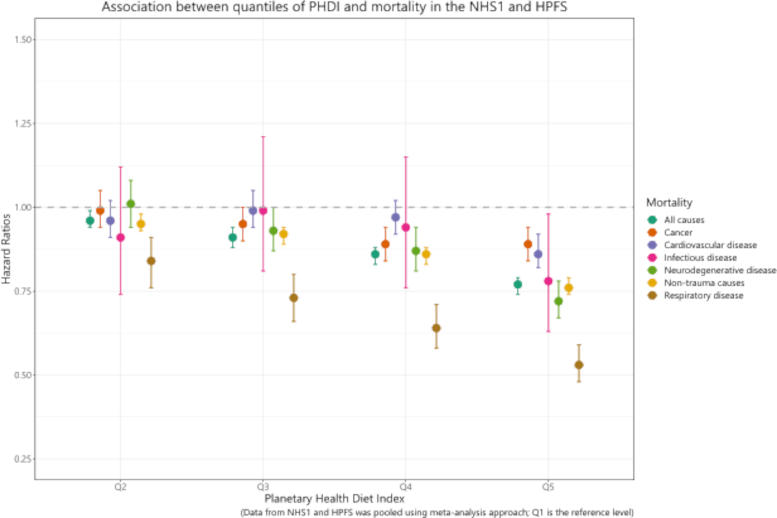
A new study reveals the benefits of a sustainable diet on longevity and health. People adhering to an environmentally friendly diet had a 25% lower risk of death over a 30-year period. The research developed a Planetary Health Diet Index (PHDI) that relates food groups to health outcomes and environmental impacts. Those with higher PHDI scores had lower risks of death from various diseases. However, there are challenges in adopting such a diet universally, given the diverse health conditions, religious beliefs, and food accessibilities of populations worldwide.
A new diet score reveals foods that are a win-win for your health and the environment.
Eating more planet-friendly foods could help you live a longer, healthier life, according to new research. Researchers found that people who followed a more environmentally sustainable diet were 25% less likely to die during a follow-up period of over 30 years compared to those with a less sustainable diet.
Link Between Diet and Health
The study builds upon prior research that identified foods that are a win-win for both health and the environment—such as whole grains, fruit, non-starchy vegetables, nuts, and unsaturated oils—as well as foods that could be harmful to the environment and human health, like eggs and red and processed meats. The new findings suggest eating more planet-friendly foods can help reduce a person’s risk of death from causes such as cancer, heart disease, respiratory diseases, and neurodegenerative diseases.
“We proposed a new diet score that incorporates the best current scientific evidence of food effects on both health and the environment,” said Linh Bui, MD, a PhD candidate in the Department of Nutrition at Harvard T.H. Chan School of Public Health. “The results confirmed our hypothesis that a higher Planetary Health Diet score was associated with a lower risk of mortality.”

A plot of the relationship between risk of death from various causes and adherence to the Planetary Health Diet Index (PHDI). People in the highest quintile for PHDI (Q5) showed a significantly lower risk of death from all causes compared with those in the lowest quintile. Credit: Linh Bui et al. at NUTRITION 2023
Bui will present the findings at NUTRITION 2023, the flagship annual meeting of the American Society for Nutrition held July 22–25 in Boston.
Environmental and Health Impact of Diet
According to existing evidence, plant-based foods are associated with both a lower risk of chronic diseases such as heart disease, colorectal cancer, diabetes, and stroke, and reduced impacts to the environment in terms of factors like water use, land use, nutrient pollution, and greenhouse gas emissions.
With the new study, the researchers aimed to create a simple tool that policymakers and public health practitioners could use to develop strategies to improve public health and address the climate crisis.
“As a millennial, I have always been concerned about mitigating human impacts on the environment,” said Bui. “A sustainable dietary pattern should not only be healthy but also consistent within planetary boundaries for greenhouse gas emissions and other environmental parameters.”
The Planetary Health Diet Index (PHDI)
To create their Planetary Health Diet Index (PHDI), researchers reviewed existing research on the relationships between various food groups and health outcomes based on the EAT-Lancet reference diet that accounts for the environmental impacts of food production practices. They then applied the index to analyze outcomes among over 100,000 participants in two large cohort studies conducted in the United States. The data set included over 47,000 deaths during a follow-up period spanning over three decades from 1986-2018.
Overall, they found that people in the highest quintile (the top one-fifth of participants) for PHDI had a 25% lower risk of death from any cause compared to those in the lowest quintile. Higher PHDI scores were associated with a 15% lower risk of death from cancer or cardiovascular diseases, a 20% lower risk of death from neurodegenerative disease, and a 50% lower risk of death from respiratory diseases.
Bui cautioned that the PHDI does not necessarily reflect all food items and their relationships with all major diseases in all countries. People with specific health conditions, religious restrictions, or different food accessibility due to socioeconomic status or food availability may face challenges with adhering to a more sustainable diet pattern. Further research could help to elucidate and address such barriers.
“We hope that researchers can adapt this index to specific food cultures and validate how it is associated with chronic diseases and environmental impacts such as carbon footprint, water footprint, and land use in other populations,” said Bui.
Reference: “Planetary Health Diet Index and Risk of Total and Cause-Specific Mortality in Two Prospective Cohort Studies” by Linh P. Bui, Tung T. Pham, Fenglei Wang, Marta Guasch-Ferre and Walter C. Willett, 23 July 2023, NUTRITION 2023.
Abstract
NUTRITION 2023 featured several studies using the Planetary Health Diet Index for which Bui is a co-author. Andrea Romanos-Nanclares, PhD, presented “Planetary Health Diet Index and Risk of Total and Subtypes of Breast Cancer in the Nurses’ Health Studies” during the Nutritional Epidemiology (I) Poster Session (abstract; presentation details). Caleigh Sawicki, Ph.D., presented “Planetary Health Diet and Risk of Incident Cardiovascular Disease: Findings From Two Cohorts of US Women” during the Dietary Patterns and Health Outcomes Oral Session (abstract; presentation details).








The biggest crock of “science” I have seen in a while.
This is not science its propaganda.
Biggest issue is that young people are so uneducated and ignorant on the truth that they believe this stuff.
Mental programming.
Environmental friendly foods? Eggs and meat bad!!! LMFAO
Yet on this same site another article talks about the enormous amounts of power it takes to run AI and how it can consume more than entire cities alone.
And not a peep about how that is bad for the environment.
I don’t know if this is propagnada, but it seems garbage. The study is unpublished and not peer reviewed, as the link to the abstract is for a docx file on a Dropbox file-sharing site that doesn’t work?
Judging from the article, the idea was to cross-reference healthy foods with environmentally-efficient crops. That’s not a proper way to judge a healthy diet, and dietary science is unreliable. Eating only the healthiest most-environmentally-friendly food is not a balanced diet. Anyone making themselves sick to fight climate change is doing the planet a disservice. Beyond that, dietary advice to every person regardless of any individuality is going to fail; if a reader has healthy-but-low Vitamin B12 levels, advising cutting out red meat may do harm.
I have seen repeated studies which seemed reliable that found certain processed meats preserved with nitrates have negative health impacts. The studies I saw which found negative health impacts from eggs and beef were from the 1990s and 2000s respectively, and were contradicted by more recent studies. Anyone who trusted those dietary studies, and for example solved their cholesterol problem by not eating eggs, maybe already died.
I believe that humans are omnivores and as such need to eat a well rounded diet but this is a debated topic so lets look at other flawed aspects of this article.
So how is red meat, and eggs bad for the environment. This is stated as a fact with no explanation. Livestock can be kept in areas that are unsuitable for growing crops such as rocky pastures. It would take a great deal of machinery to make such land suitable for crops, and this machinery would in tern be bad for the environment because it would burn on fossil fuels. Also cows and other livestock eat plant matter that humans cannot digest and produce various resources we can use, from red meat, and milk to waste that can be turned into fertilizer for crops.
Live with cows and the methane the produce, or use big fossil fuel burning engine powered equipment that is also bad for the environment to make cow pastures cropland.
Also what do we do with all of the cows when we stop eating them, they will still be living, breading, and farting methane. Should we kill all cows and other animals that produce significant amounts of greenhouse gasses. OH NO!!! all air breathing animals exhale carbon dioxide which is bad for the environment. But then it would be wasteful not to use the meat, but the meat is bad for us so who should we force to eat the meat???